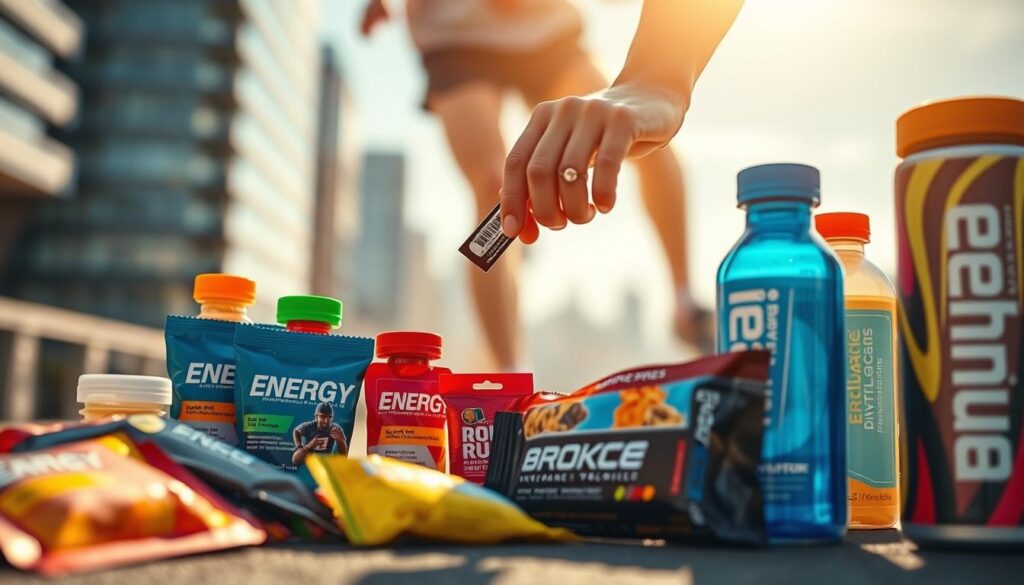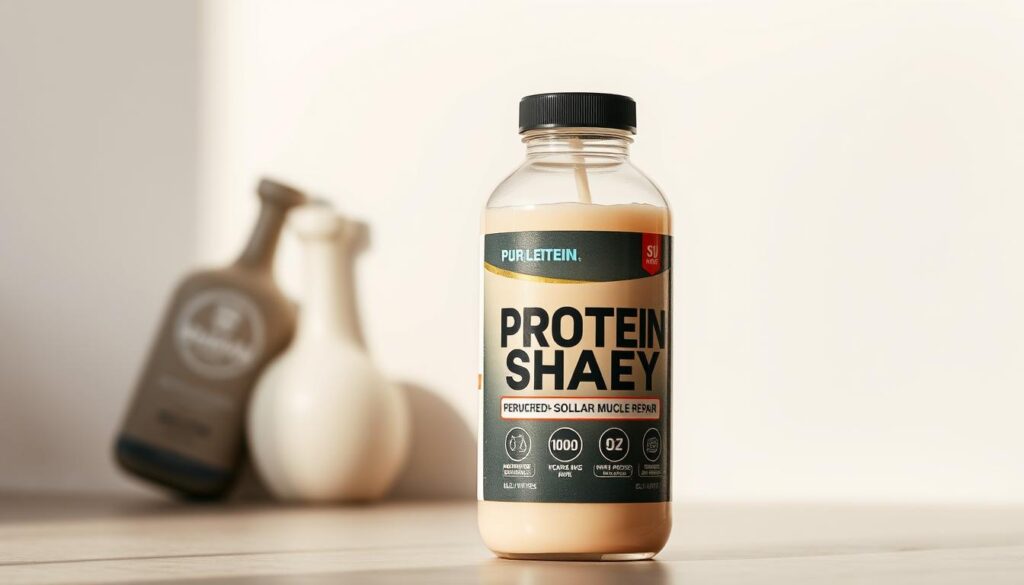Ever felt your legs turn to lead halfway through a long run? Or watched the clock drag during a grueling workout? I’ve been there too—doubled over mid-trail, wondering why my best efforts suddenly felt impossible. That’s when I realized: what you eat isn’t just about calories. It’s the invisible partner in every rep, mile, and personal record.
Your body operates like a precision engine. Research shows stored carbs (glycogen) fuel about two hours of moderate exercise. After that? Without smart fueling, you’re running on fumes. But here’s the game-changer: strategic nutrition helps bypass those energy crashes entirely.
This isn’t about rigid meal plans or choking down bland chicken breasts. We’ll explore how tech like glucose monitors fine-tunes your intake timing. You’ll learn why some marathoners thrive on oatmeal while others need sweet potatoes—and how to discover what works for your unique metabolism.
Key Takeaways
- Glycogen stores directly impact workout stamina and recovery speed
- Personalized fueling beats generic diet advice for lasting results
- Tech tools provide real-time data to optimize nutrition timing
- Under-eating can sabotage even the most intense training efforts
- Whole foods form the foundation, supplements enhance performance
Whether you’re chasing a 5K milestone or an ultramarathon finish line, the right approach turns nutrition from an afterthought into your secret weapon. Let’s transform how you power through every challenge.
Understanding Your Nutritional Needs for Endurance Training
Does your energy crash before your workout ends? Your plate might hold the answer. Active women aged 19-30 need up to 2,400 daily calories, while men in the same age range require up to 3,000. Yet nearly 60% of active individuals under-fuel, according to USDA data.
Assess Your Current Diet and Performance Goals
Start by tracking meals for three days. Apps like MyFitnessPal reveal gaps between what you eat and what your body burns. Notice patterns:
- Frequent afternoon energy slumps
- Muscle soreness lasting over 48 hours
- Workout times getting shorter
These signal mismatched energy availability – calories consumed minus exercise expenditure. For endurance efforts, aim for at least 30 calories per pound of body weight daily.
Identifying Key Nutrient Priorities
Iron transports oxygen. Vitamin D boosts muscle function. B12 converts food into fuel. Yet 42% of runners lack these nutrients. Fix this with:
- Leafy greens + citrus (iron absorption)
- Fortified cereals or sunlight exposure (vitamin D)
- Eggs or nutritional yeast (B12)
Remember: Your sweat rate, sleep quality, and recovery speed all shape your unique needs. Adjust portions as training intensity shifts.
Carbohydrate Strategies: Fueling and Recovery
Have you ever bonked mid-race despite perfect training? The secret lies in mastering your carbohydrate rhythm – a precise dance between loading, burning, and restoring energy stores. Your muscles store about 500 grams of glycogen, but events lasting over 90 minutes demand smarter tactics.

Pre-Race Carbo-Loading Techniques
Three days before race day, aim for 4-5 grams of easy-to-digest carbs per pound of lean body weight. White rice, bananas, and sourdough bread work better than fiber-rich options. “This strategic loading boosts glycogen stores by 25-50% compared to normal intake,” notes a study on proper fueling strategies.
During-Race Energy Boosts
For efforts lasting over 45 minutes, consume ¼-⅓ of your weight in carb grams hourly. A 150-pound athlete needs 38-50 grams. Mix glucose and fructose sources like energy gels or dried fruit to maximize absorption. This dual-fuel approach can extend endurance by 18%.
Post-Exercise Replenishment
Within 30 minutes post-workout, drink a shake with 50-100 grams of carbs. Liquid forms like chocolate milk or recovery drinks restore glycogen 40% faster than solid foods. Pair with protein to kickstart muscle repair while keeping energy levels stable.
Remember: Your body processes carbs differently during stress. Test these strategies in training to find your personal carb sweet spot – the difference between hitting the wall and breaking records.
Protein Intake for Endurance: Building and Repairing Muscle
Muscle recovery isn’t just about rest—it’s what you eat that counts. While carbs get most attention for energy, protein serves as your body’s repair crew. It rebuilds microtears from intense sessions and helps convert stored fuel into usable energy when glycogen runs low.

Calculating Your Body’s Blueprint
Forget generic “1g per pound” rules. Calculate needs using lean body mass instead. A 180-pound athlete with 10% fat needs 80-120g daily. Multiply lean weight (total weight minus fat) by 0.5-0.75. Those in calorie deficits should aim higher to protect muscle.
The Rhythm of Repair
Timing matters as much as totals. Consume 10-20g within 30 minutes post-workout when muscles are sponges. During ultra-events, 5g/hour preserves glycogen. Pre-race? 10-20g 2-3 hours before start time stabilizes energy without gut stress.
Choose complete proteins like eggs or quinoa that supply all nine essential amino acids. Pair plant sources strategically—rice and beans form a complete profile. Spread intake across 4-6 meals to maximize absorption and maintain steady recovery.
Remember: Higher training loads demand more protein. Track soreness and recovery rates—if they worsen, reassess your intake. Your muscles tell the truth when numbers lie.
Electrolyte Balance and Hydration Essentials
Have you ever wondered why drinking too much water can be as dangerous as not drinking enough? Your fluid balance acts like a thermostat for peak performance. Lose just 2% of your body weight through sweat, and reaction times slow. Gain too much water without electrolytes, and cells swell dangerously.
Finding Your Fluid Sweet Spot
Calculate your sweat rate: weigh yourself before and after training. For every pound lost, drink 20-24 ounces of fluid. In hot weather, add 8-10 ounces every 15 minutes. Watch for these warning signs:
| Dehydration | Overhydration | Electrolyte Fix |
|---|---|---|
| Dark urine | Clear urine | 500mg sodium |
| Muscle cramps | Headaches | 200mg potassium |
| Racing heart | Nausea | 100mg magnesium |
Urine color should match pale lemonade. If it’s apple juice-dark, sip 8 ounces every 15 minutes until balanced. For sessions over 60 minutes, choose drinks with sodium – it helps retain water three times longer than plain H₂O.
High altitudes? Increase fluid intake by 25%. Humid conditions? Replace electrolytes faster. Your body whispers clues – learn its language to avoid fatigue and power through every mile.
Caffeine and Its Role in Performance
What if your morning brew could shave minutes off your race time? Science shows caffeine boosts endurance performance by 2-5% when timed right. It works three ways: spares muscle glycogen through increased fat burning, tricks your brain into feeling less effort, and sharpens mental focus when fatigue sets in.
Your response depends on genetics. Fast metabolizers process caffeine quickly, getting energy surges without jitters. Slow metabolizers might experience prolonged effects or sleep disruption. A simple DNA test can reveal which type you are.
Finding Your Ideal Caffeine Dose
Start with 100mg (one espresso) 2-3 hours before training. During long races, add 25mg every 45 minutes through gels or chews. Never exceed 500mg daily—more isn’t better. “Caffeine’s benefits plateau at 3mg per pound of body weight,” notes sports nutritionist Dr. Emma Clarke.
Try this protocol:
- 10-day caffeine reset before big events
- Test doses during key workouts
- Combine with carb-rich foods to stabilize glucose
Watch for shaky hands or stomach issues—these signal overconsumption. If caffeine disagrees with you, try beetroot juice or tart cherry concentrate for alternative energy boosts. Your perfect dose exists between science and self-awareness.
Nutritional Hacks for Endurance Athletes and Gym-Goers
What separates good performances from great ones often lies in your kitchen. Small shifts in your diet create lasting changes—no extreme overhauls needed. Focus on quality first, then fine-tune quantities to match your training demands.
Simple Adjustments for Optimal Energy
Swap quick-burning snacks for healthy fats like almonds or avocado slices. These provide steady fuel without blood sugar crashes. For every hour of activity, aim for 30-60g of complex carbs like oats or sweet potatoes—the Mayo Clinic’s gold standard.
Integrating Nutrient-Dense Foods
Build meals around colorful plants and lean proteins. Spinach packs iron for oxygen transport. Quinoa delivers complete proteins. Nutrients in whole foods work synergistically—something supplements can’t replicate. Prep portable options like hard-boiled eggs or chia pudding for busy days.
Your body thrives on consistency, not perfection. Start with one change—maybe adding olive oil to post-workout meals—and track how your energy levels respond. That’s how lasting progress begins.
